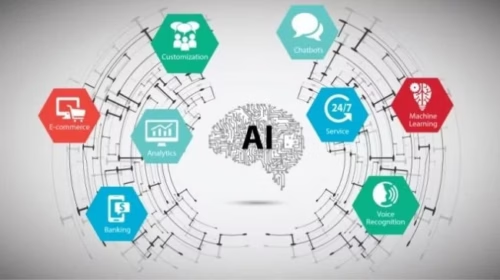If you want to hire computer vision developers, then you have just landed on the right page. The growth of computer vision, a branch of artificial intelligence (AI), is impressive!
Computer vision systems are used in self-driving cars, traffic flow analysis, cancer detection, digital pathology, product assembly, predictive maintenance, crop monitoring, etc. Various industries and sectors such as manufacturing, healthcare, agriculture, construction, government, etc. embrace computer vision applications eagerly. Many technology giants in Silicon Valley and elsewhere are aggressively embracing computer vision.
The global market of computer vision will likely grow to $41.11 billion by 2030 from $9.45 billion in 2020. That translates to a healthy 16.0% CAGR between 2020 and 2030.
Naturally, the demand for computer vision developers continues to grow rapidly. Skilled and experienced computer vision engineers get attractive remuneration packages. It takes hard work to hire them.
If you hire freelancers, then you are likely signing up for risks much bigger than your risk appetite. We suggest hiring the right computer vision developer from DevTeam.Space.
At first, you need to understand the skill requirements, which are as follows:
Primary skills required by computer vision engineers
A computer vision engineer needs a bachelor’s degree in computer science, information technology, or a related field. Such developers need the following primary skills:

Get a complimentary discovery call and a free ballpark estimate for your project
Trusted by 100x of startups and companies like
1. In-depth knowledge of computer vision
Good computer vision developers need a sound knowledge of the following:
- Object detection techniques;
- Techniques to identify objects;
- Image recognition;
- Image segmentation;
- Feature extraction from images;
- Image classification;
- Object tracking;
- Image representation;
- Facial recognition;
- Barcode scanning;
- Optical character recognition;
- Techniques to analyze visual data;
- Developing image analysis algorithms;
- Data flow programming;
- How to extract valuable insights from visual data.
Computer vision engineers should know the relevant hardware and software platforms, e.g.:
- Google Cloud Platform;
- AWS;
- Azure;
- Microsoft Kinect;
- Intel RealSense.
Developers need expert-level knowledge of the important computer vision algorithms, e.g.:
- Scale-Invariant Feature Transform (SIFT);
- Speeded Up Robust Features (SURF);
- Histogram of Oriented Gradients (HOG);
- You Only Look Once (YOLO).
2. Deep knowledge of machine learning and other artificial intelligence capabilities
Computer vision engineers need a sound knowledge of machine learning. They should know the following:
- The important machine learning algorithms;
- Deep learning;
- Neural nets like a convolutional neural network (CNN);
- Reinforcement learning;
- Transfer learning;
- Creating and deploying machine learning models;
- Implementing deep learning models.
Computer vision experts should have data analytics knowledge. Developers might need knowledge of other relevant AI models. If you need developers with experience in natural language processing, data science, etc., then specify that in the job ad.
3. Technology stack, programming languages, etc.
Computer vision experts should know the following:
- Object-oriented programming;
- One of the important programming languages for computer vision, e.g., Python, C++, Java, etc.;
- Useful computer vision development libraries for their programming language of choice, e.g., OpenCV for C++, Scikit-Image for Python, etc.;
- Prominent open-source SQL databases like MySQL and PostgreSQL.
- NoSQL databases like MongoDB;
- Deep learning frameworks like TensorFlow, PyTorch, Scikit-learn, Deeplearning4J, etc;
- Version-control tools like Git.
4. Mathematics
Computer vision developers should have sufficient knowledge in the following branches of mathematics:
- Linear algebra;
- 3D geometry;
- Pattern recognition;
- Basic convex optimization;
- Calculus involving gradients;
- Bayesian probability.
5. Preparing data for training and testing
Computer vision engineers should know how to prepare for training and testing a computer vision system. They need to know the following:
- Collecting data from relevant sources;
- Organizing data;
- Parsing data;
- Reviewing data for anomaly detection.
- Finding errors, inconsistencies, and biases in data;
- Correct data errors;
- Converting data sets into the required format;
- Splitting data sets for training and testing.
Note: If you need the computer vision developer to have other skills like web development, augmented reality, etc., then please specify that explicitly in the job ad.
Other skills needed by computer vision experts
Computer vision experts need the following other skills
1. Knowledge of coding secure applications
A computer vision development project processes huge data sets. You don’t want a data breach or tampering with data. Computer vision developers should know how to mitigate important application security risks, e.g.:
- Access control loopholes;
- Injection errors, like SQL injection.
- Using software components with security vulnerabilities;
- Using software components that are outdated;
- Faulty authentication workflows.
You need to implement measures like multi-factor authentication, encryption, firewalls, etc. at an organizational level. Computer vision engineers should know sufficiently about these to give you the right advice.
2. Software engineering processes, methods, tools, and best practices
Computer vision engineers should have sufficient knowledge of the following:
- Software development methodologies like agile.
- Frameworks like Scrum;
- Coding and testing best practices;
- DevOps practices and tools;
- Code review.
A technical leader who guides a team should have considerable expertise in these.
1,200 top developers
us since 2016
3. Knowledge of how organizations in different industries use computer vision to gain business value
An image recognition application in a retail company will have vastly different functionalities from an object tracking application used by national security agencies. We show this example only to highlight the diverse use of computer vision across industries. A smart computer vision developer should know how to use this technology to solve the problems of your target industry.
4. The ability to deliver value in a complex project environment
Computer vision developers should expect to work on complex projects due to the advanced nature of this technology. Meeting business needs in complex environments requires much more than just technical knowledge. Computer vision engineers should know how to work in a team, e.g.:
- Active listening;
- Problem-solving;
- Communicating in a timely and effective;
- Understanding the perspective of end-users.
How to hire computer vision experts?
Start the process of hiring computer vision developers. Do the following:
1. Choose a suitable approach for hiring
Some companies might look to hire freelancers. Several online freelance platforms exist, and they have a considerable reach.
Businesses might negotiate a low hourly rate. Companies with financially limited resources for a project might prioritize software development manpower cost savings.
However, they might end up exposing themselves to high risks. Freelance platforms employ a hands-off approach. You are on your own after you hire a freelancer.
Some freelancers might work on multiple projects, whereas, other freelancers might not work sufficiently. You will notice the average time to deliver software development tasks increasees considerably.
One finds it hard to evaluate the relevant expertise of freelancers. Freelancers might claim to have certain skills, however, the reality could vary!
What if freelancers leave your project in the middle of it? This can have a significant impact on your project since the schedule is thrown off track. You need to hire replacement developers. Remember that freelance platforms don’t facilitate the process of hiring replacements.
You should rather hire full-time developers from a reliable software development company like DevTeam.Space. We offer the following advantages:
- Dedicated, skilled, experienced, and motivated computer vision developers selected via our thorough vetting process;
- A robust AI-powered agile process;
- A flexible hiring process;
- Project management support;
- An efficient and flexible engagement model.
2. Conduct interviews effectively
Now that you have chosen a hiring approach and posted your job ad, you need to interview candidates. You need to spend less time interviewing if you hire from DevTeam.Space. Our stringent screening process ensures quality.
Your interviewing efforts increase if you hire freelancers though. Take assistance from knowledgeable associates if needed. You can utilize our interview questions, e.g., Python interview questions.
Make sure that you cover all skill areas during the interview. Focus more on project experience than theoretical questions. Explain your project requirements and ask how developers will approach these. You should expect concrete suggestions and not jargon.
3. Help the new team members to become productive quickly
Onboard developers effectively. Do the following:
- Explain the project requirements and technical solutions.
- Provide them with the required documents, such as functional requirements.
- Grant the necessary access.
- Explain the processes followed and the project schedule.
- Set up a communication process with the new developers.
- Introduce them to your existing team and explain the roles and responsibilities.
A few interview tips for hiring computer vision engineers
We offer the following suggestions for interviewing/hiring computer vision developers:
1. Look for experience in relevant use cases
Computer vision is a vast branch of artificial intelligence. The use cases are diverse and their implementation varies considerably.
Developers with good experience in implementing one use case might not have ever implemented another use case. For example, engineers who developed autonomous systems or object detection systems might lack experience in edge devices or sentiment analysis. You should hire developers with experience in your target use case.
2. Avoid looking for computer vision experts with too many other skills
Computer vision engineering is a set of niche skills. Supplies for niche skills tend to be constrained. Accordingly, there isn’t a vast pool of computer vision developers.
If you want a computer vision developer with too many other skills, then your hiring lead time might be very long! You can reasonably expect computer vision engineers to understand data analysis. However, you will find it hard to get computer vision experts who also double up as expert data scientists. Focus on the primary skill requirements.
3. Do evaluate the knowledge of machine learning algorithms when interviewing candidates
Computer vision development projects often use ML algorithms extensively. The following are a few algorithms that are used often:
- K-nearest neighbour;
- Convolutional neural networks;
- Gradient boosting trees;
- Random forest;
- Decision tree learning.
You should spend sufficient time assessing whether candidates know the important ML algorithms well.
Sample interview questions for finding computer vision developers
The following are examples of questions to assess the depth of skills of developers:
1. What is the use of anchor boxes?
Computer vision engineers use anchor boxes for object detection. They can isolate various elements of images using anchor boxes. For example, they assign separate values to the size, shape, and location. Anchor boxes especially help with analyzing images with many variables, a public place with a crowd.
2. How to train a convolutional neural network even with a small dataset?
Transfer learning is a useful technique to train CNNs even with a small dataset. Computer vision developers often use this solution. They train the model using the later classification layers or just the last layer.
Computer vision engineers can use transfer learning in another way too. They can find a suitable open-source pre-trained model. Subsequently, they can take parameters initialized from this model. They can train the CNN with these parameters.
3. How will you train a neural network to recognize objects from an image?
One needs to take the following steps for this:
- Gather enough data.
- Label the data suitably. The labels help a neural network learn about what the objects look like. One can do this manually or use OpenCV.
- Use a supervised learning algorithm to train the neural network on the labeled dataset.
- Adjust the relevant parameters during the training to optimize the model.
- Evaluate the performance of the model using metrics like precision, recall, F1 score, etc.
Submit a Project With Zero Risk
Developing intelligent systems powered by computer vision takes considerable effort. You will often use advanced machine learning techniques along with computer vision. These are niche AI technology capabilities, which make computer vision development projects complex. You can’t settle for anything less than world-class talent for such projects.
We are at DevTeam.Space are uniquely poised to support you. Our machine learning, natural language processing, and computer vision developers have developed many complex systems catering to multiple industries. Our world-class development processes help you to succeed.
Fill out the DevTeam.Space product specification form. An experienced account manager will soon contact you and explain how we can help.











